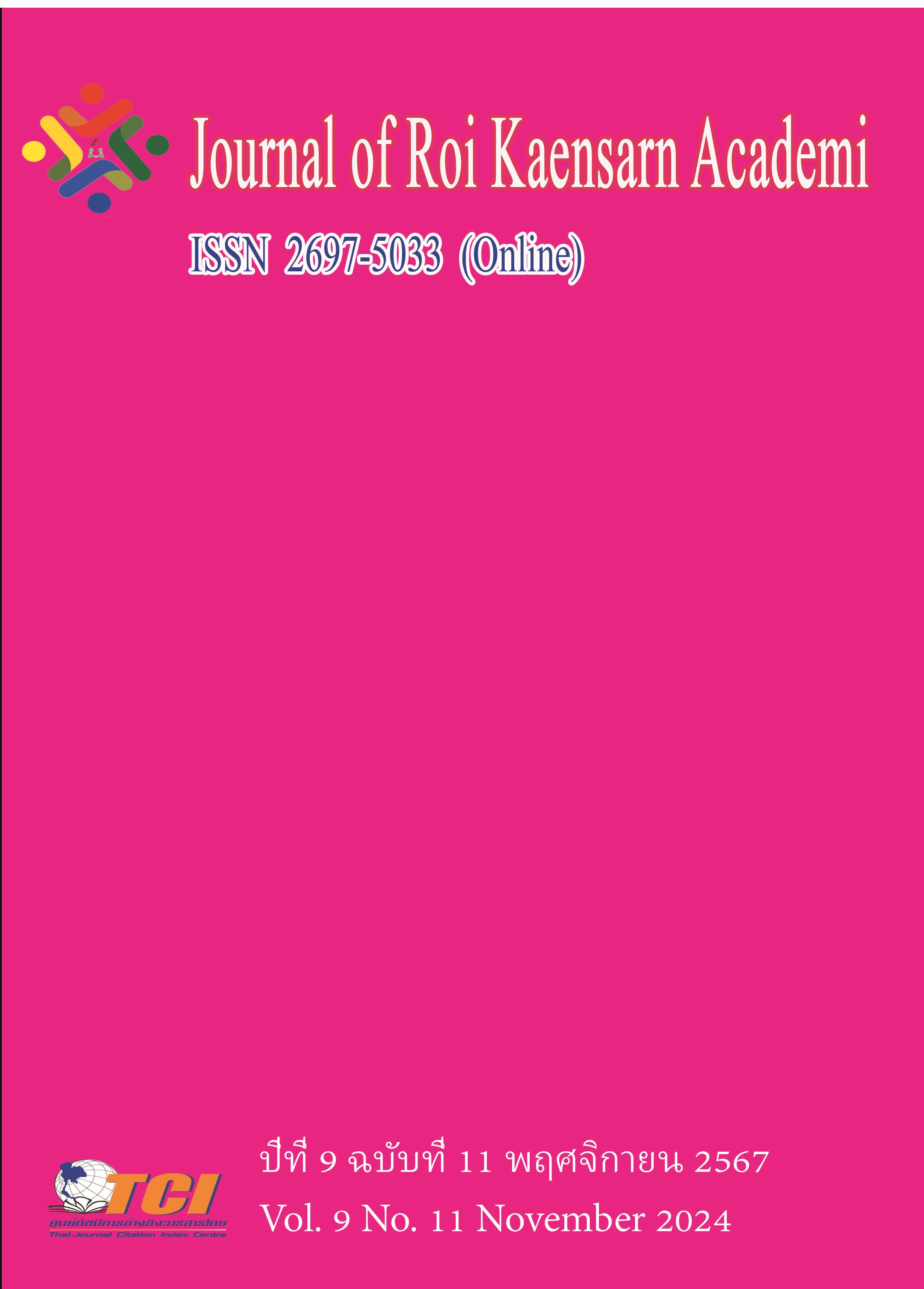The Key Success Factors of Sino-Foreign Educational Cooperation in Art Colleges and Universities Under Liaoning Province
Main Article Content
บทคัดย่อ
Driven by economic globalization and increasing social demand, Sino-foreign cooperative education has expanded rapidly. Yet, the overall quality and impact of such initiatives across the country remain modest. The efficacy of Sino-Foreign educational cooperation is contingent not only on the stringent management of educational administrative bodies and comprehensive legal frameworks but also on the internal management and operations of the institutions themselves. While external improvements take time, individual institutions can rapidly enhance their educational quality by optimizing internal factors.
The objectives of this research were:(1) to explore key success factors of Sino-Foreign educational cooperation in art colleges and universities under Liaoning Province; and (2) to verify key success factors of Sino-Foreign educational cooperation in art colleges and universities under Liaoning Province; and (3) to develop managerial guidelines for Sino-Foreign educational cooperation in art colleges and universities under Liaoning Province.
The research was a mixed methodology research. Population was the research consisted of 236 college administrators1876 teachers in 5 colleges and universities under Liaoning Province the People's Republic of China, totalling 2112. The sample size was determined by Krejcie and Morgan's Table (1970), obtained by stratified random sampling technique sampling method, totalling 325. The key informants were composed of 15key informants, including Chinese senior administrators of Sino-Foreign educational cooperation in art colleges and universities, Foreign senior administrators of Sino-Foreign educational cooperation in art colleges and universities, teachers from Sino-Foreign educational cooperation,and policy maker from the government education department, obtained by purposive sampling method. The instruments used for data collection were a semi-structured interview form, a five-point rating scale questionnaire, and a Focus Group Discussion form. The statistics used for data analysis were frequency, percentage, mean, Standard Deviation and Exploratory Factor Analysis, as well as the content analysis was employed.
The research findings revealed that: (1) there were seven components and 96 variables of key success factors of Sino-Foreign educational cooperation in art colleges and universities under Liaoning Province. (2) verified the 96 variables that are the key success factors of Sino-Foreign educational cooperation in art colleges and universities under Liaoning Province; and (3) there were total of 31 managerial guidelines of Sino-Foreign educational cooperation in art colleges and universities under Liaoning Province.
Based on these findings, the study concludes that a robust understanding and implementation of the identified variables and managerial guidelines are crucial for maximizing the success of Sino-Foreign educational collaborations in art colleges and universities under Liaoning Province. This comprehensive framework not only facilitates better management practices but also enhances the overall quality and effectiveness of these cooperative educational programs.
Article Details
References
Cai, Z. M., & Mao, Y. Q. (2013). Globalization of higher education: Logic and connotation. Research in Higher Education, (07), 10-17.
Chen, H. L. (2019). Research on the intercultural adaptation of students in Sino-Foreign educational cooperation programs: A case study of Sanming College. Journal of Hunan University of Science and Engineering, (08), 94-96. https://doi.org/ 10.16336/j. cnki.cn4 3-1459/z.2019.08.026
Chen, X. F. (1997). Internationalization of higher education: From history to theory to strategy. Shanghai Higher Education Research, (11), 59-63.
Gong, F., & Zhao, S. M. (1987). Internationalization of universities: Trends in higher education development. Higher Education Research, (04), 29-35.
Han, X. T. (2023). Research on the construction of the assessment system for Sino-Foreign educational cooperation at the undergraduate level (Master's thesis, Shandong University of Finance and Economics). https://doi.org/10.27274/d.cnki.gsdjc. 2023. 000082
Huang, Y., Yun, J. H., & Long, W. (2022). Research on the construction of teacher management systems in Sino-Foreign educational cooperation based on Hall's three-dimensional structure. Science and Education Guide, (24), 66-68. https:// doi.org/10. 16400/j.cnki.kjdk.2022.24.021
Li, B. W. (2019). Research on the teaching quality assurance system for Sino-Foreign educational cooperation in higher education in Hebei Province (Master's thesis, Hebei University). Online. Retrieved from https://kns.cnki.net/kcms2/article/abstract?v =wc PNn8Zia7OSaIfIE3OH6whoLYFFXczp2nYSfG-yJ4HvS87aEAmU3hf8toZMEGv D5F6uiKUNlx1QXYbPSG9yL9v3UJWfBwGePS5xzqCDUH5LwtpfND0qbyj_ozcumDytbdhMe3MCk9NFscmTXYA1Bw==
Li, C. M. (2020). Construction of internationalized curriculum: The cornerstone of quality assurance in Sino-Foreign educational cooperation in higher education. Journal of Jiangsu Normal University (Philosophy and Social Sciences Edition), (03), 113-122+124. https://doi.org/10.16095/j.cnki.cn32-1833/c.2020.03.009
Li, Z. Y., & Wang, Z. W. (2021). Outcome-oriented curriculum design. Higher Education Development and Evaluation, (03), 91-98+113.
Lin, J. H. (2017). New characteristics, issues, and trends of Sino-Foreign educational cooperation in the new era. China Higher Education Research, (12), 35-37+55. https://doi.org/10.16298/j.cnki.1004-3667.2017.12.09
Song, C. X. (2023). Exploration of the internationalization of faculty teams in Sino-Foreign educational cooperation in colleges: A case study of Ulster College at Shaanxi University of Science and Technology. Science and Education Guide, (13), 90-92. https://doi.org/10.16400/j.cnki.kjdk.2023.13.029
Tan, Y. (2013). Research on the intercultural adaptation of students in Sino-Foreign educational cooperational programs (Doctoral dissertation, Minzu University of China). Online. Retrieved from https://kns.cnki.net/kcms2/article/abstract?v =wcPNn 8Zia7PwVSLEdwodPXAsMj389nzv6VadalYf1TJEjTN0jdqzagWOCft-24AW00x DtepvVBmYFf2eKr_2rZtczk_Rn0J1TZdBS0hYe5vaXN3mgO0pis-cpYEgQpQGH Fu2E9xgljEz6xMN3psdCg==
Wang, G. T., & Zhang, P. Y. (2023). Intercultural adaptation and communication integration theory by Jin Yang Yong. Journal of Huaqiao University (Philosophy and Social Sciences), (05), 138-147. https://doi.org/10.16067/j.cnki.35-1049/c.2023.05.005
Wang, H. (2011). Construction and improvement of the quality assurance system for Sino-Foreign educational cooperation in universities (Master's thesis, Inner Mongolia Agricultural University). Online. Retrieved from https://kns.cnki.net/kcms2/ article/ abstract?v=wcPNn8Zia7NePD1urqD4p_NPkJ9EGZRToSo21C5MDHef8WXC5yqcKItwNfc1T5_oa3mjwF1YOqxON5LB9uhg_ws_IURweWz2rFmTHUhJUozrGRFWPrZBOn6tBCrrkWBM8_QV2BUptZkHJXUAe58fg==
Wang, Y. (2018). Application of blended learning in art and design courses in universities. Studies in Art Education, (07), 92-93.
Xia, T. (2018). Reflections on the internationalization of the faculty in higher vocational colleges under Sino-Foreign educational cooperation: An analysis from the perspective of human resource management functions. Modern Business Trade Industry, (23), 171-173. https://doi.org/10.19311/j.cnki.1672-3198.2018.23.081
Xu, H., & Zhang, Q. (2023). Acceptance, adaptation, and integration: Intercultural exchanges in Chinese dance before and after the reform and opening up. Journal of Beijing Dance Academy, (03), 41-47.
Zhao, J. X. (2019). Research on the models of Sino-Foreign educational cooperation in higher education (Master's thesis, Lanzhou University). Online. Retrieved from https://kns. cnki.net/kcms2/article/abstract?v=wcPNn8Zia7NLmf4Dj3ZNSLWDBUvZfzW0xe6jqSzxDRtmZBfM9WTIdqY0Hsw5UQrOFWGZjKomGEIWPOdCqHLHo29fokC6GGOwOtvdUXME9Br6htYQ2B9Jkh_Kn7zH3QRA8Q2fydiMY5lZ6oLna1zPwA==
